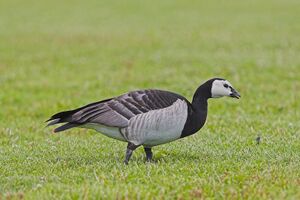Badul nouns: jughran: Difference between revisions
Jump to navigation
Jump to search
(Created page with "===Etymology=== From Middle Badul ''eln'', ''elen'', from Old Badul ''elan'', from Ucerian ''eland'', from Areric ''elant'', from Proto-Bintic ''elantī''. Cognate with Torse ''eilit'' (doe), Kuprian ''lant'' (doe). thumb|eln ===Pronunciation=== * ''(stressed)'' **'''IPA''': /e̞un͈/ /ɛun͈/ * ''(unstressed)'' **'''IPA''': /əʊn͈/ /əun͈/ ===Definition=== ====Noun==== '''eln''' (''genitive'' '''elne''', ''dative'' '''elni'...") |
No edit summary |
||
| Line 1: | Line 1: | ||
===Etymology=== | ===Etymology=== | ||
From Middle Badul '' | From Middle Badul ''jughran'', ''iughran'', from Old Badul ''ghiughran'', ''ghioghran'', from Ucerian ''giughran'', from Areric ''giugran'', from Proto-Bintic *gigranos. | ||
Cognate with Torse '' | Cognate with Torse ''giúrann'' (barnacle goose), Kuprian ''giùran'' (barnacle goose). Borrowed by Poil, as ''hiuranne''. | ||
[[File: | [[File:Barnacle Goose - Branta leucopsis.jpg|thumb|jughran]] | ||
===Pronunciation=== | ===Pronunciation=== | ||
* ''(stressed)'' | * ''(stressed)'' | ||
**'''IPA''': / | **'''IPA''': /jʊːɾan/ /juːɾan/ | ||
* ''(unstressed)'' | * ''(unstressed)'' | ||
**'''IPA''': / | **'''IPA''': /jʊːɾ(ə)n/ /juːɾ(ə)n/ | ||
[[Category: Badul]] | [[Category: Badul]] | ||
Revision as of 11:12, 16 June 2024
Etymology
From Middle Badul jughran, iughran, from Old Badul ghiughran, ghioghran, from Ucerian giughran, from Areric giugran, from Proto-Bintic *gigranos. Cognate with Torse giúrann (barnacle goose), Kuprian giùran (barnacle goose). Borrowed by Poil, as hiuranne.
Pronunciation
- (stressed)
- IPA: /jʊːɾan/ /juːɾan/
- (unstressed)
- IPA: /jʊːɾ(ə)n/ /juːɾ(ə)n/
